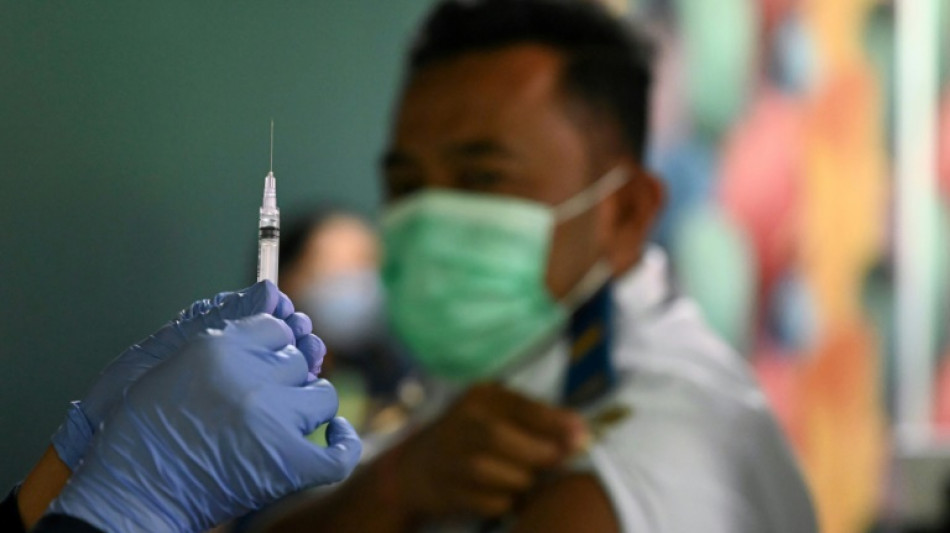
-
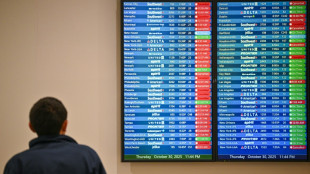 US to cancel flights as longest govt shutdown drags on
US to cancel flights as longest govt shutdown drags on
-
Home in Nigeria, ex-refugees find themselves in a war zone
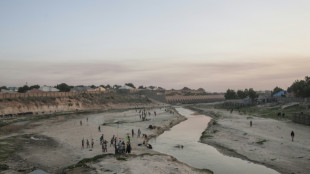
-
 Doncic's Lakers hold off Wembanyama's Spurs, Blazers silence Thunder
Doncic's Lakers hold off Wembanyama's Spurs, Blazers silence Thunder
-
For Turkey's LGBTQ community, draft law sparks existential alarm

-
 Musk's $1 trillion pay package to face Tesla shareholder vote
Musk's $1 trillion pay package to face Tesla shareholder vote
-
Tonga rugby league star out of intensive care after seizure

-
 Argentine ex-president Kirchner goes on trial in new corruption case
Argentine ex-president Kirchner goes on trial in new corruption case
-
Dams, housing, pensions: Franco disinformation flourishes online
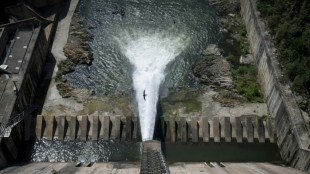
-
 Endo returns as Japan look to build on Brazil win
Endo returns as Japan look to build on Brazil win
-
Franco captivates young Spaniards 50 years after death

-
 German steel industry girds for uncertain future
German steel industry girds for uncertain future
-
IPL champions Bengaluru could be sold for 'as much as $2 billion'

-
 Budget impasse threatens Belgium's ruling coalition
Budget impasse threatens Belgium's ruling coalition
-
New Zealand ex-top cop admits to having material showing child abuse, bestiality

-
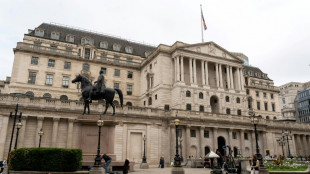 BoE set for finely balanced pre-budget rate call
BoE set for finely balanced pre-budget rate call
-
Australian kingpin obtains shorter sentence over drug charge

-
 Weatherald's unenviable Ashes task: fill giant hole at top left by Warner
Weatherald's unenviable Ashes task: fill giant hole at top left by Warner
-
Ovechkin first to score 900 NHL goals as Capitals beat Blues

-
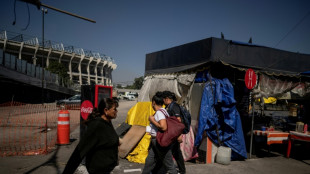 On Mexico City's streets, vendors fight to make it to World Cup
On Mexico City's streets, vendors fight to make it to World Cup
-
Asian markets bounce from selloff as US jobs beat forecasts

-
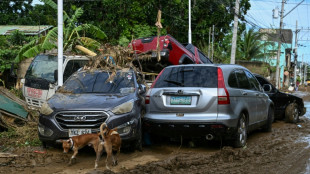 Philippine death toll tops 140 as typhoon heads towards Vietnam
Philippine death toll tops 140 as typhoon heads towards Vietnam
-
Kyrgios targets 'miracle' Australian Open return after knee improves
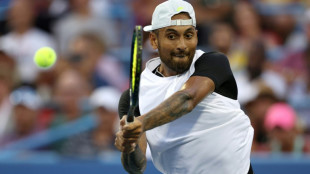
-
 'AI president': Trump deepfakes glorify himself, trash rivals
'AI president': Trump deepfakes glorify himself, trash rivals
-
Belgium probes drone sightings after flights halted overnight

-
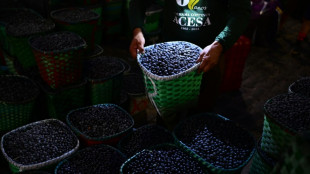 Five things to know about 'forest COP' host city Belem
Five things to know about 'forest COP' host city Belem
-
World leaders to rally climate fight ahead of Amazon summit

-
 Engine fell off US cargo plane before deadly crash: officials
Engine fell off US cargo plane before deadly crash: officials
-
Mexican leader calls for tougher sexual harassment laws after attack

-
 Meghan Markle set for big screen return: reports
Meghan Markle set for big screen return: reports
-
Japan deploys troops after wave of deadly bear attacks

-
 FIFA announce new peace prize to be awarded at World Cup draw in Washington
FIFA announce new peace prize to be awarded at World Cup draw in Washington
-
Australia's Cummins hints at return for second Ashes Test

-
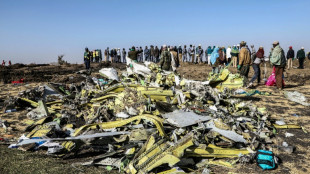 Boeing settles with one plaintiff in 737 MAX crash trial
Boeing settles with one plaintiff in 737 MAX crash trial
-
Man City win as Inter stay perfect, Barca held in Champions League

-
 French superstar DJ Snake wants new album to 'build bridges'
French superstar DJ Snake wants new album to 'build bridges'
-
Barca rescue draw at Club Brugge in six-goal thriller

-
 Foden hits top form as Man City thrash Dortmund
Foden hits top form as Man City thrash Dortmund
-
NBA officials brief Congress committee over gambling probe

-
 Inter beat Kairat Almaty to maintain Champions League perfection
Inter beat Kairat Almaty to maintain Champions League perfection
-
Newcastle sink Bilbao to extend Champions League winning run

-
 Wall Street stocks rebound after positive jobs data
Wall Street stocks rebound after positive jobs data
-
LPGA, European tour partner with Saudis for new Vegas event

-
 Eyes turn to space to feed power-hungry data centers
Eyes turn to space to feed power-hungry data centers
-
Jazz lose Kessler for season with shoulder injury

-
 League scoring leader Messi among MLS Best XI squad
League scoring leader Messi among MLS Best XI squad
-
MLS bans Suarez for Miami's winner-take-all playoff match

-
 McIlroy appreciates PGA of America apology for Ryder Cup abuse
McIlroy appreciates PGA of America apology for Ryder Cup abuse
-
Garnacho equaliser saves Chelsea in Qarabag draw

-
 Promotions lift McDonald's sales in tricky consumer market
Promotions lift McDonald's sales in tricky consumer market
-
Five things to know about New York's new mayor


World 'dangerously unprepared' for next crisis: Red Cross
All countries remain "dangerously unprepared" for the next pandemic, the Red Cross warned on Monday, saying future health crises could also collide with increasingly likely climate-related disasters.
Despite three "brutal" years of the Covid-19 pandemic, strong preparedness systems are "severely lacking", the International Federation of Red Cross and Red Crescent Societies (IFRC) said.
The world's largest humanitarian network said building trust, equity and local action networks were vital to get ready for the next crisis.
"All countries remain dangerously unprepared for future outbreaks," the IFRC said, concluding that governments were no more ready now than in 2019.
It said countries needed to be prepared for "multiple hazards, not just one", saying societies only became truly resilient through planning for different types of disaster, as they can occur simultaneously.
The IFRC cited the rise in climate-related disasters and waves of disease outbreaks this century, of which Covid-19 was just one.
It said extreme weather events were growing more frequent and intense, "and our ability to merely respond to them is limited".
The IFRC issued two reports making recommendations on mitigating future tragedies on the scale of Covid-19, on the third anniversary of the World Health Organization declaring the virus an international public health emergency.
"The Covid-19 pandemic should be a wake-up call for the global community to prepare now for the next health crisis," said IFRC secretary general Jagan Chapagain.
"The next pandemic could be just around the corner; if the experience of Covid-19 won't quicken our steps toward preparedness, what will?"
The report said major hazards harm those who are already vulnerable the most, and leaving the poorest exposed was "self-defeating", as a disease can return in a more dangerous form.
- Breakdown of trust -
The IFRC said if people trusted safety messages, they would be willing to comply with public health measures and accept vaccination.
But the organisation said crisis responders "cannot wait until the next time to build trust", urging consistent cultivation over time.
The IFRC said if trust was fragile, public health became political and individualised -- something which impaired the Covid response.
It also said the coronavirus pandemic had thrived on and exacerbated inequalities, with poor sanitation, overcrowding, lack of access to health and social services, and malnutrition creating conditions for diseases to thrive in.
"The world must address inequitable health and socio-economic vulnerabilities far in advance of the next crisis," it recommended.
The organisation also said local communities should be leveraged to perform life-saving work, as that is where pandemics begin and end.
The IFRC called for the development of pandemic response products that are cheaper, and easier to store and administer.
By 2025, it said countries should increase domestic health finance by one percent of gross domestic product, and global health finance by at least $15 billion per year.
The IFRC said its network had reached more than 1.1 billion people over the past three years to help keep them safe during the Covid pandemic.
F.Müller--BTB




